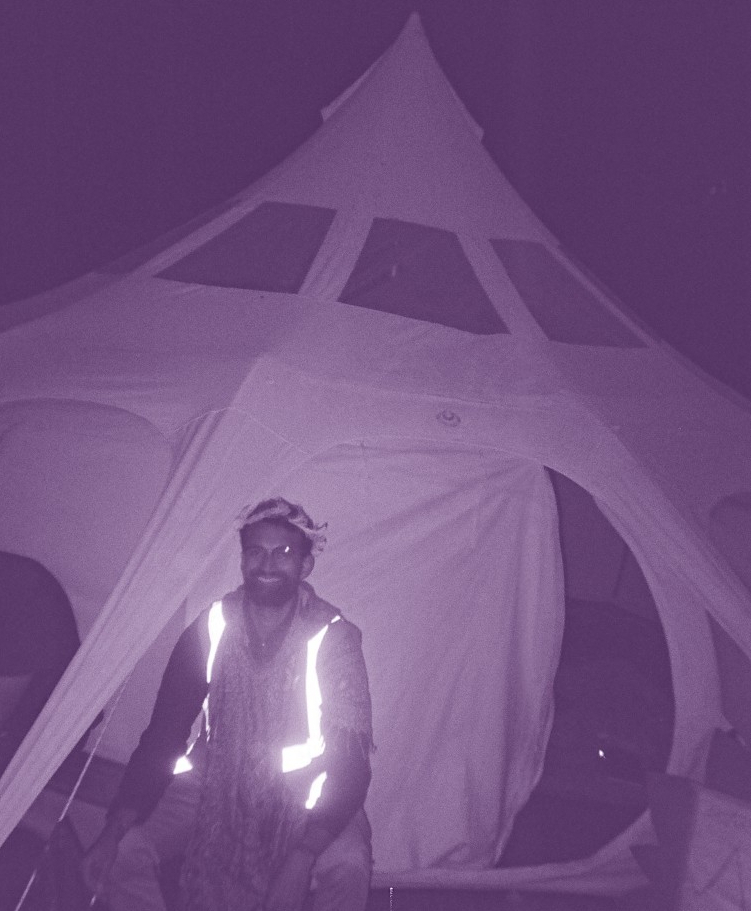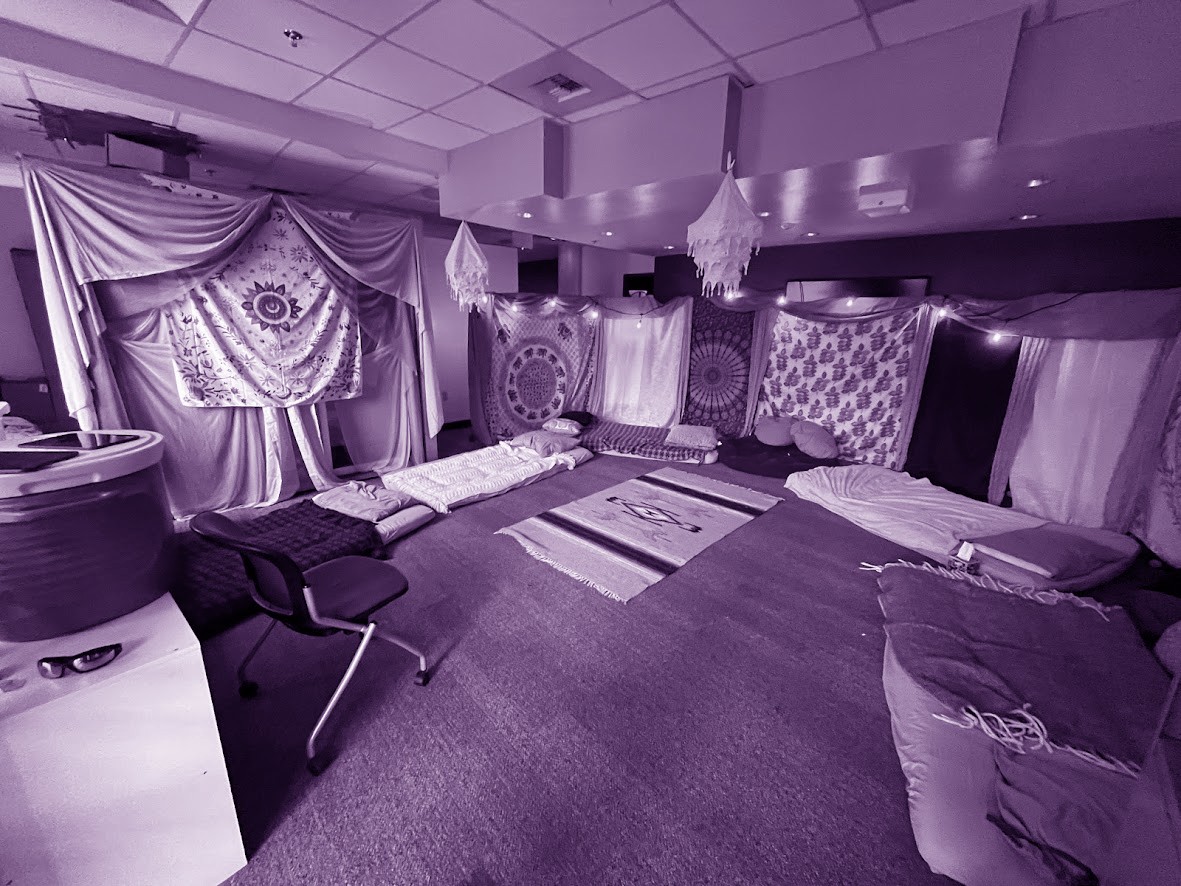A guy on four tabs of acid, barely able to walk. A dude “in touch with aliens.” A man who said he couldn't breathe.
At festivals and concerts, these people had taken psychedelics and flipped out or crashed out. And they were some of the people PsyDAO members have helped in recent months, volunteering for harm reduction organizations PsyCare and Zendo to create safe spaces across Cyprus, Germany, Texas, and Colorado.
Psychedelics can open doors to joy, insight, and connection—but sometimes the journey gets rough. When that happens, psychedelic harm reduction provides what matters most: soft mats, blankets, low lighting, and the simple reminder that no one has to go through it alone.
These PsyDAO volunteers said their sessions were sometimes challenging, often rewarding, but they served as inspiration and fuel for us to continue PsyDAO's mission of decentralizing psychedelic use and creating, as our tagline says, "a new set and setting for psychedelics."
Why Psychedelic Harm Reduction is Essential
Psychedelic services are only legal in about 10 countries and two U.S. states, meaning the vast majority of the millions of trips that happen every year occur in situations without professional guidance.
By far, most of these everyday trips unfold without incident. At the festivals and concerts where PsyDAO members participated, tens of thousands of people used psychedelics without any need for care. Research backs up the idea that psychedelics are generally safe and well-tolerated. One survey of hundreds of psychedelics users found that about 60 percent had never had a challenging, difficult, or distressing experience.
Dealing with Difficulty
Yet research also shows that challenging experiences do happen, and they can be devastating. One survey found that 3 percent of the people who filled out the survey "sought medical, psychiatric, or psychological assistance in the days/weeks following their most distressing psychedelic experience."
The blog Ecstatic Integration catalogues psychedelic harm, and has shown that, when challenging experiences aren't properly navigated and integrated during a journey, they can leave lasting psychological difficulties. PsyDAO members themselves have gotten “spun” on ayahuasca or DMT; at least one was so convinced that silence put him in touch with “Something Greater” that he refused to speak for a week.
If you’re having trouble before, during, or after a trip, a psychedelic emergency hotline is available through the Fireside Project.
PsyDAO Members' Volunteer Efforts
The push to expand our sphere of care was boosted by a blog post about Barış, a PsyDAO core member who volunteered at a festival on the island of Cyprus. There, Baris helped people having challenging psychedelic experiences. One woman even told the team, "You saved my life."
Reading about Barış inspired other PsyDAO members to take action. "His actions had a ripple effect," said Steven Fülle, one of PsyDao’s core contributors.
Read: 'You Saved My Life': We Built a Safety Net at a Psychedelic Fest. You Can Too.

Steven's Experience: Presence as Harm Reduction
Steven Fülle's work at Germany's New Healing festival revealed a crucial insight: most harm reduction happens before anyone needs direct care. Working overnight shifts with the festival's awareness team, Steven discovered the power of visible presence.
"When I put on that vest, I felt the energy that previous generations of care providers had built," Steven reflected. "People would come up just to thank us for being there. I realized that just by our presence, we probably prevent most potential harm." Visible care spaces reassure thousands who never walk through the door: knowing help is available "makes them feel safe," reducing panic before it starts.
The variety of needs was striking during his second night shift when multiple incidents clustered around 3 AM: From helping someone experiencing breathing difficulties at the peak of their LSD trip to providing massage oil for an MDMA-enhanced threesome, the types of care required by festival goers can be just as multifaceted as the psychedelic experience itself.
Read about our new project: A Gas Pedal for Endogenous DMT

ReCap's Experience: Large-Scale Concert Care
PsyDAO core member ReCap volunteered with the Zendo project at the Texas Eclipse Festival and a Phish concert in Colorado. His experience distills why visible, low-barrier harm-reduction services matter even when acute crises are rare.
At the Phish show that drew an estimated 40,000–50,000 people, the Zendo room welcomed "eight or ten guests all night," most of whom simply needed water, a quiet mat and a calm presence while an intense dose settled. ReCap was struck by the contrast between the crowd size and the tiny number requiring hands-on help, calling it "a good illustration of how generally safe psychedelics are."
One example made the point that low-stress interventions can make a huge difference: a man on four tabs of LSD was ushered in by his buddy, barely able to speak or walk. ReCap helped lay him down, offered water and silent companionship. The work felt minimal—"I sat there and meditated," ReCap admitted—but invaluable, demonstrating how simple reassurance can avert escalation. Three hours later the guest walked out under his own power.
Later at the Phish show, police delivered a disoriented, paranoid attendee who tore at wall tapestries and feared he'd been drugged. Three sitters spent nearly an hour grounding him until he was stable enough for an Uber home. That calm presence helped him avoid a trip to jail or to the hospital.
The Zendo medical director, Case Newsom, who was at the Phish show, told Joe Moore of Psychedelics Today that he believed Zendo’s presence significantly reduced the number of patients who needed to be transported to the hospital.
Read: In Longevity Tests, PsyDAO and PumpScience Pit LSD vs Psilocin
Decentralized Organization, Decentralized Care
There's a beautiful symmetry happening here. Just as Ethereum showed the world that value could be exchanged without banks, psychedelic harm reduction shows that care can be provided without centralized institutions. Both operate on principles of decentralization, peer-to-peer trust, and collective responsibility.
This work spreads like ripples. At first, there was one PsyDAO member stepping up to provide PsyCare at a festival. Then there were two. Then three. Each act of care inspires the next, and what begins as a single vest, a quiet tent, or a simple gesture of presence can ripple outward into a global culture of safety and compassion. From Cyprus to Germany to America, these ripples are already visible—and they are growing.
Because PsyDAO has a diverse and enthusiastic community, we can take individual initiative or decentralized initiative to take action in myriad ways—whether that's participating in conferences, through teaching, through workshops, or in this growing effort at festivals and concerts.
We are now assembling a global network of individuals willing to provide PsyCare. If you feel called to contribute, reach out on our Discord. Together, we can continue building safe spaces for psychedelic journeys wherever they are needed.
Ready to participate in the future of psychedelics?
DAOs are powered by regular people working toward their passions. If you believe in the power of psychedelics and Web3 and want to contribute to PsyDAO, please: